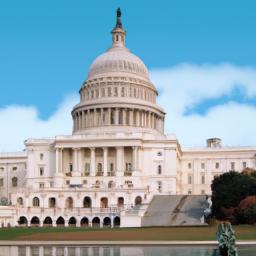The United States Congress is responsible for making and approving federal laws – rules that everyone in the country must follow. This legislative body, consisting of the House of Representatives and the Senate, plays a crucial role in shaping the legal framework of the nation.
Congress has the power to pass laws on a wide range of issues, including but not limited to healthcare, taxation, immigration, civil rights, and national security. It is through this process that landmark decisions, such as Roe v. Wade, the landmark 1973 case that established a constitutional right to abortion, are translated into enforceable statutes.
While Congress holds the primary responsibility for making federal laws, the process is often complex and involves multiple steps. It begins with the introduction of a bill, which can originate in either the House or the Senate. Once introduced, the bill goes through committee hearings, where experts and stakeholders provide input and make amendments.
After committee review, the bill moves to the full chamber for debate and voting. If it passes in one chamber, it proceeds to the other for a similar process. Both the House and the Senate must agree on the final version of the bill before it can be sent to the President for approval or veto.
The role of Congress in making federal laws is not limited to creating new legislation. It also involves the power to modify, repeal, or amend existing laws based on the changing needs and priorities of the nation. This dynamic process ensures that laws remain relevant and responsive to evolving societal challenges.
One aspect of federal lawmaking that often sparks contentious debates is the balance between individual rights and public interests. For example, a federal law that makes it a crime for a person to encourage illegal immigration has been subject to scrutiny, with arguments raised regarding its impact on constitutional free speech protections.
In addition to their legislative responsibilities, members of Congress also play a crucial role in representing their constituents' interests. They serve as a voice for their districts and states, advocating for their concerns and priorities. This representation ensures that federal laws align with the diverse needs and perspectives of the American people.
Federal political parties may use legislation passed in Congress as the foundation for their argument that they should be exempt from certain regulations or requirements. The interpretation and application of these laws can vary, leading to debates and legal challenges that shape the scope and reach of federal legislation.
While Congress holds the primary authority in making federal laws, the President also plays a crucial role in the process. The President can propose legislation, influence the priorities of Congress through their agenda-setting power, and ultimately sign or veto bills passed by Congress.
However, in some cases, the President may invoke executive power to take significant actions that bypass Congress. For instance, the Biden administration made a significant move by invoking a rarely used executive power, which frequently determines national security policies and actions.
The lawmaking process is not limited to domestic issues. Congress also addresses matters of international importance through legislation. National security concerns, international treaties, trade agreements, and foreign aid are among the areas where Congress exercises its oversight and legislative authority.
Organized crime and racketeering are issues that Congress tackles through legislation. Racketeering typically refers to crimes committed through extortion or coercion, often associated with organized crime. Congress enacts laws to combat these illegal activities and protect the interests and safety of the American people.
While federal laws govern various aspects of public life, there are areas where Congress allows flexibility for individual states to enact their own laws. Drug-free workplace policies, for example, are not mandatory for most private employers, except those subject to federal regulations.
In conclusion, Congress plays a pivotal role in making federal laws that shape the legal landscape of the United States. Through a complex and dynamic process, legislation is introduced, debated, and ultimately passed or rejected. The work of Congress reflects the diverse interests and needs of the American people and ensures that laws align with the principles and values of the nation.
